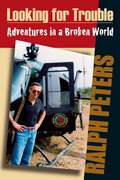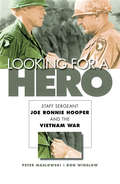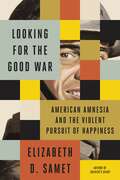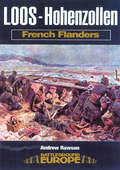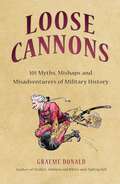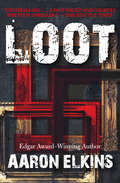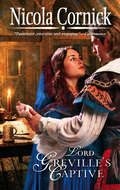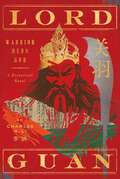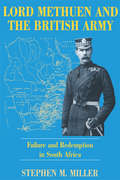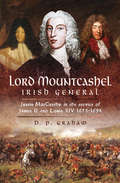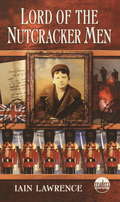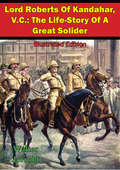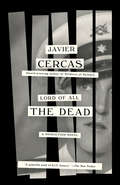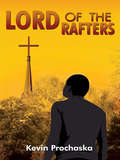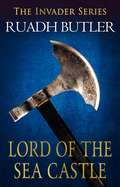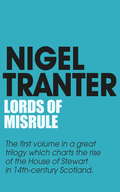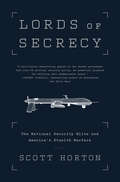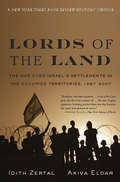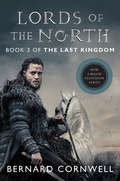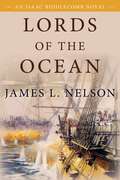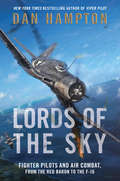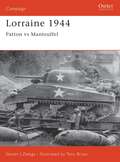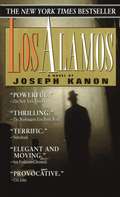- Table View
- List View
Looking for Trouble
by Ralph PetersRalph Peters--career soldier, controversial strategist, prize-winning, best-selling novelist, erstwhile rock musician, popular columnist, and old-fashioned adventurer--has always been good for a surprise. Now, for the first time, Peters recounts the personal experiences that shaped his views of the world, from the collapsing Soviet Union to the drug wars of the Andean Ridge, from quiet forays into Burma and Laos to military missions to Pakistan and the Caucasus--and on to the Southwest border of the United States and the meanest streets of Los Angeles. As the U.S. Army's chosen troubleshooter before he took off his uniform to write, Peters saw the greatest international dramas of our times and the personal tragedies they created from a truly unique perspective--and took advantage of every moment "outside of the wire." The result is startling: the liveliest adventure memoir by an American in decades, a perfect balance of high drama and laugh-out-loud hilarity. Readers--among them his many devoted fans--will meet a faded beauty and former favorite singer of Josef Stalin's, now in her nineties and still a hopeless coquette; KGB officers who refuse to let go of the past in Moscow's back streets; a winsome princess adrift in a dying world; the corrupt Thai police general whose hobby was imitating Elvis to karaoke machines in rural bordellos; sentimental Caucasian gangsters; oblivious diplomats; wary Burmese colonels; doomed Mexican drug cops; Mennonite marijuana farmers; lonesome Nazi widows in Bolivia--and their Jewish friends; Muslim fundamentalists who write love poetry to imagined sweethearts . . . and, above all, the author's two loyal brothers-in-arms who sometimes shared the dangers and the wonder at the "back of beyond" and whose remarkable personal backgrounds, dashingly eccentric personalities, and appetite for adventure explode every cliché about military officers. Beautifully written and hauntingly told, Looking for Trouble is simply the book Ralph Peters was born to write. We can all be glad that he came back alive to write it.
Looking for a Hero: Staff Sergeant Joe Ronnie Hooper and the Vietnam War
by Don Winslow Peter MaslowskiWidely acclaimed as the Vietnam War's most highly decorated soldier, Joe Ronnie Hooper in many ways serves as a symbol for that conflict. His troubled, tempestuous life paralleled the upheavals in American society during the 1960s and 1970s, and his desperate quest to prove his manhood was uncomfortably akin to the macho image projected by three successive presidents in their "tough" policy in Southeast Asia. Looking for a Hero extracts the real Joe Hooper from the welter of lies and myths that swirl around his story; in doing so, the book uncovers not only the complicated truth about an American hero but also the story of how Hooper's war was lost in Vietnam, not at home. Extensive interviews with friends, fellow soldiers, and family members reveal Hooper as a complex, gifted, and disturbed man. They also expose the flaws in his most famous and treasured accomplishment: earning the Medal of Honor. In the distortions, half-truths, and outright lies that mar Hooper's medal of honor file, authors Peter Maslowski and Don Winslow find a painful reflection of the army's inability to be honest with itself and the American public, with all the dire consequences that this dishonesty ultimately entailed. In the inextricably linked stories of Hooper and the Vietnam War, the nature of that deceit, and of America's defeat, becomes clear.
Looking for the Good War: American Amnesia and the Violent Pursuit of Happiness
by Elizabeth D. Samet"Essential reading. This eloquent, far-ranging analysis of the national psyche goes as far as any book I've ever read toward explaining the peculiar American yen for war and more war." —Ben Fountain, author of Billy Lynn's Long Halftime Walk and Beautiful Country Burn AgainIn Looking for the Good War, Elizabeth D. Samet reexamines the literature, art, and culture that emerged after World War II, bringing her expertise as a professor of English at West Point to bear on the complexity of the postwar period in national life. She exposes the confusion about American identity that was expressed during and immediately after the war, and the deep national ambivalence toward war, violence, and veterans—all of which were suppressed in subsequent decades by a dangerously sentimental attitude toward the United States’ “exceptional” history and destiny. Samet finds the war's ambivalent legacy in some of its most heavily mythologized figures: the war correspondent epitomized by Ernie Pyle, the character of the erstwhile G.I. turned either cop or criminal in the pulp fiction and feature films of the late 1940s, the disaffected Civil War veteran who looms so large on the screen in the Cold War Western, and the resurgent military hero of the post-Vietnam period. Taken together, these figures reveal key elements of postwar attitudes toward violence, liberty, and nation—attitudes that have shaped domestic and foreign policy and that respond in various ways to various assumptions about national identity and purpose established or affirmed by World War II.As the United States reassesses its roles in Afghanistan and the Middle East, the time has come to rethink our national mythology: the way that World War II shaped our sense of national destiny, our beliefs about the use of American military force throughout the world, and our inability to accept the realities of the twenty-first century’s decades of devastating conflict.
Loos: French Flanders (Battleground Europe)
by Andrew RawsonIn September 1915 Kitcherner's men were in action for the first time in the largest offensive of the year. Using gas, British troops managed to open a three mile gap in the German line. However, misuse of the reserves allowed the chance of success to pass by. In the following struggle for Hohenzollern Redboubt, the British were defeated time after time by superior weapons and tactics. For the first time visitors will be able to explore this key battle, a battle that cost the BEF over 50,000 casualties.
Loose Cannons: 101 Things They Never Told You About Military History
by Graeme DonaldFrom the author of Sticklers, Sideburns, and Bikinis comes this funny, often irreverent look at two thousand years of lies, inaccuracies, propaganda, deceit, downright foolishness, and little-known facts from the ars militaria. On Hitler: "[No one] ever produced 'proof' of Hitler having won the Iron Cross, Second Class without which the First Class could not be awarded. He was a liar, but his favorite WWI yarn, about his life being spared by a British soldier who had him dead in his sights, is unfortunately true. It seems we have Private Henry Tandy VC, then of the Green Howards, to thank for all the fun of Round 2 with Germany." On Che Guevara: "The darling of week-end rebels and champagne socialists, Guevara continues to be lauded by the intellectually bankrupt who sport his image on T-shirts, making Guevara the only racist, mass murderer to become a fashion-accessory. He neither lived nor died a hero and almost everything trumpeted about him is false." On the Lusitania: She was not an American liner; she was not sunk on her maiden voyage; she was not an 'innocent' sunk without warning by the nasty Germans; the incident was not responsible for America's entry into WW1, and as for British connivance into her sinking, the jury is still out on that. On breast enhancement surgery: One of the more unusual 'developments' from WWII, to say the least, but modern breast enhancement techniques were a direct result of the American occupation of post-war Japan.
Loot
by Aaron ElkinsIn April 1945, The Nazis, reeling and near defeat, frantically work to hide the huge store of art treasures that Hitler has looted from Europe. Truck convoys loaded with the cultural wealth of the Western world pour in an unending stream into the compound of the vast Altaussee salt mine high in the Austrian Alps. But with the Allies closing in, the vaunted efficiency of the Nazis has broken down. At Altaussee, all is tumult and confusion. In the commotion a single truck, its driver, and its priceless load of masterpieces vanish into a mountain snowstorm.Half-a-century later, in a seedy Boston pawnshop, ex-curator Ben Revere makes a stunning discovery among the piles of junk: a Velazquez from the legendary Lost Truck. But with it come decades of secrets, rancor, and lies, and the few who know of the painting's existence have their lives snuffed out one by one by an unknown assassin. Revere must travel back to the grand cities of Europe to unravel the tangled history of the lost truck and its treasures before fifty years of hatred, greed, and retribution catch up with him.
Lord Greville's Captive
by Nicola CornickThe English Civil War tests the bonds between a lord and lady engaged to be married in this historical romance.Years before, he had come to Grafton Manor to be betrothed to the innocent and beautiful Lady Anne—a promise that was broken with the onset of war. . . .Now Simon, Lord Greville, has returned as an enemy, besieging the manor and holding its lady hostage. Simon’s devotion to his cause swayed by his desire for Anne, he will not settle for the manor house alone. He will have the lady—and her heart—into the bargain!Yet Anne has a secret that must be kept from him at all costs. . . .
Lord Guan
by Charles N. LiFor fans of SHOGUN (and from the publisher of the bestseller WICKED by Gregory Maguire) comes another iconic story inspired by a real-life world-famous hero, LORD GUAN, the honorable warrior who tried to restore the Han dynasty in second-century China. His military maneuvers, warrior brotherhood, and an unexpected romance with a brilliant escaped concubine have inspired millions of people for generations. Lord Guan (also known as Guan-Yu) has been the subject of television, films, operas, and video games worldwide. Dozens of temples have been built to pay homage to him worldwide. He is known as the God of Good Fortune and also represents honor, courage and loyalty. This historical tale is now fully imagined in a dramatic and modern retelling and is being developed as a rap musical that will inspire readers of all generations for years to come.Guan Yu (160 - 220 A.D.), also known as Guan Gong (Lord Guan), has been celebrated as a pan-Asiatic hero for well over a thousand years. He has been repeatedly canonized and deified across Asia. This historically detailed novel tells the story of his humble beginnings in a rural setting, his unexpected journey into martial arts, the murder of his family members, his unexpected love story, and his emergence as an invincible warrior. It follows his dedication to restoring the great Han Dynasty (206 B.C. - 220 A.D.) during a tumultuous and war-torn period in Chinese history. At the outset of his mission, he forms a brotherhood with two equally idealistic supporters of the Han Dynasty. Together, the three men, known as the Peach Garden Brothers, become the backbone of a military force competing against warlords for control of the declining Han Empire. Throughout the years of conflict, Lord Guan encounters Xian-Hui, a talented and educated beauty kidnapped by eunuchs from the Imperial Palace who is forced to serve as a concubine. With great courage, she escapes her bondage and unexpectedly meets Lord Guan during her frightening getaway. Lord Guan ultimately sacrifices his life for his mission. Although he did not succeed in restoring the Han Dynasty, his legendary exploits have become an integral part of Chinese folklore. He has endured in the hearts and minds of millions throughout history as a symbol of courage, integrity, and loyalty. This novel dramatically retells this enchanting true-life story, enriched with informative historical details. Lord Guan's adventures were first romanticized in the classic epic of Chinese literature, the 14th-century novel "The Romance of the Three Kingdoms." Charles Li's "Lord Guan" is a modern and dramatic retelling of this historically significant tale. Lord Guan's character has been commemorated through the centuries in thousands of shrines across Asia and in various media, including opera, film, art, literature, and video games. This novel highlights his journey and tells the story of the making of a timeless hero who symbolizes courage, honor, loyalty and integrity—values that will have broad appeal to readers of all ages during this challenging time.
Lord Methuen and the British Army: Failure and Redemption in South Africa
by Stephen M. MillerThis study analyzes the readiness of the British military establishment for war in 1899 and its performance in the South African War (1899-1902). It focuses on the career of Field Marshal Paul Sanford, 3rd Baron Methuen, whose traditional military training, used so effectively in Queen Victoria's small wars, was put to the test by the modern challenges of the South African War. A subsidiary aim of this work is to correct and refine the historical consensus that Methuen's campaing in the South African War was plagued by practical errors and poor judgement. The South African War was a crucial transitional episode in the history of the British army. Unlike Great Britain's other expeditions, it required the concentrated resources of the entire empire. It was a modern war in the sense that it employed the technology, the weaponry, the communications, and the transportation of the second industrial revolution.
Lord Mountcashel: Justin MacCarthy in the Service of James II and Louis XIV, 1673–1694
by D. P. GrahamJustin MacCarthy (later Lord Mountcashel) was born into a notable family of Irish Jacobites, loyal to the exiled Stuarts, and grew up in France. Their Irish land was regained after the Restoration of Charles II but Justin, as the youngest surviving son, sought a career in the French army (as both his father and oldest brother had done). In 1673 he joined an Irish regiment in French service. He served under the legendary French marshals Turenne and Conde against the Dutch and their Imperial allies and by 1676 was commanding the regiment. He became part of the personal circle of the Catholic Duke of York, the future James II and, after the latters accession in 1685, Justin helped to transform the Irish army into a Catholic one.When James II was deposed in the Glorious Revolution of 1688 and fled via France to Ireland, Justin was one of the most experienced commanders resisting Williams invasion. Unfortunately MacCarthy was defeated at the Battle of Newtownbutler (1689), wounded and captured. He escaped and again went into exile in France, where he was the first commander of the famous Irish Brigade until his death in 1694.
Lord Of The Nutcracker Men
by Iain LawrenceTen-year-old Johnny eagerly plays at war with the army of nutcracker soldiers his toymaker father whittles for him. He demolishes imaginary foes. But in 1914 Germany looms as the real enemy of Europe, and all too soon Johnny’s father is swept up in the war to end all wars. He proudly enlists with his British countrymen to fight at the front in France. The war, though, is nothing like what any soldier or person at home expected. The letters that arrive from Johnny’s dad reveal the ugly realities of combat — and the soldiers he carves and encloses begin to bear its scars. Still, Johnny adds these soldiers to his armies of Huns, Tommies, and Frenchmen, engaging them in furious fights. But when these games seem to foretell his dad’s real battles, Johnny thinks he possesses godlike powers over his wooden men. He fears he controls his father’s fate, the lives of all the soldiers in no-man’s land, and the outcome of the war itself. From the Hardcover edition.
Lord Roberts Of Kandahar, V.C.: The Life-Story Of A Great Solider [Illustrated Edition]
by Walter JerroldIncludes 9 illustrations"As a leader of men in the field he is, I believe, without equal." -- Sir Alfred Milner on Lord RobertsIn this excellent short biography of Lord Roberts, Walter Jerrold, tells the tale of his many exploits and victories across the British Empire."Roberts won the Victoria Cross at Khudagani during the Indian Mutiny (1857-59) for repeated acts of gallantry, but first came to public notice during the Second Afghan War (1878-80) when he commanded the Kurram Field Force, leading it to victory at Peiwar Kotal in December 1878, and later the Kabul Field Force which occupied the Afghan capital in October 1879 following the murder of the British envoy."Roberts also led his troops on the legendary march from Kabul to Kandahar. Despite the difficult terrain and the high temperatures he covered 280 miles (400km) in 20 days and hardly lost a man. In September 1880 he defeated Ayub Khan outside Kandahar and relieved the besieged garrison. "After the early reverses of the Boer War (1899-1902), Roberts took over command of the British forces in South Africa. From December 1899, together with his Chief of Staff Major-General Horatio Herbert, Lord Kitchener, he revitalised the British military effort. Kindly, unassuming and courteous, Roberts was popularly known as 'Bobs'. His small stature and elderly appearance - he was 68 when he left South Africa in 1900 - probably increased the veneration which he received from both the public and soldiers."On returning to Britain he was made a Knight of the Garter and created Earl Roberts. Despite a bitter rivalry with the Wolseley ring, Roberts was made the last Commander-in-Chief of the British Army, a position he held for three years until 1904.After lying in state in Westminster Hall, one of only two non-Royals to do so in the 20th century, the other being Winston Churchill, he was given a state funeral."--NAM
Lord of All the Dead: A nonfiction novel
by Javier CercasFrom the internationally renowned author of The Impostor, a courageous journey into his own family history and that of a country collapsing from a fratricidal war--his most moving, most personal book, one he has spent his entire life preparing to write.Javier Cercas grew up hearing the legend of his adored great-uncle Manuel Mena, who died at nineteen in the bloodiest battle of the Spanish Civil War--while fighting for Franco's army. Who was this young man? A fascist hero whose memory is an embarrassment or a committed idealist who happened to fall on the wrong side of history? Is it possible to be a moral person defending an immoral cause? Through visits back to his parents' village in southern Spain, interviews with survivors, and research into the murkiest corners of the war, the author pieces together the life of this enigmatic figure and of an entire generation. This sui generis work combines intimate family history, investigative scholarship, personal confession, war stories, and road trips, finally becoming a transcendent portrait of a country's indelible scars--a book about heroism, death, the persistence of the past, and the meaning of an individual life against the tapestry of history.
Lord of the Rafters
by Kevin ProchaskaA bitter Mulatto man searches for meaning in his tumultuous existence while struggling to find his relationship to God.
Lord of the Sea Castle: The Invader Series (The Invader Series #2)
by Edward Ruadh ButlerIt is 1170 – a tumultuous time for the people of Wales, England and Ireland. Raymond de Carew is in love, but the woman he desires is an earl's daughter and so far above his station that he has no hope of ever winning her.However, Raymond’s lord has a mission for him: one that if it succeeds will put an Irish king back on his throne and prove Raymond worthy – for in Norman society, a man can rise as high as his skill with a sword can take him.With only a hundred men at his side, Raymond must cross the ocean to Ireland ahead of his mercenary lord's invasion. There he will face the full might of the Viking city of Waterford... and either his deeds will become legend or he will be trampled into dust.
Lords of Misrule: House of Stewart Trilogy 1
by Nigel TranterIn turbulent 14th century Scotland, the ruling House of Stewart was a house divided, beset by hatred and jealousy. Descendants of the Bruce's daughter, they only kept the throne by an astonishing genius for survival - or, as many said, the lick of the Devil. Their rivals were the Douglases; and when the second Earl was slain in battle, the Stewarts were suspected of foul play. When young Jamie Douglas vowed to avenge his master, he only had his wits, courage and integrity with which to challenge the most eminent and the most unscrupulous men in the kingdom. And while vengeance burned in his heart, he could not prevent his fatal attraction for the beautiful and spirited Stewart women - and one in particular. This is the first volume in the Stewart trilogy. 'Through his imaginative dialogue, he provides a voice for Scotland's heroes' Scotland on Sunday
Lords of Misrule: House of Stewart Trilogy 1
by Nigel TranterIn turbulent 14th century Scotland, the ruling House of Stewart was a house divided, beset by hatred and jealousy. Descendants of the Bruce's daughter, they only kept the throne by an astonishing genius for survival - or, as many said, the lick of the Devil. Their rivals were the Douglases; and when the second Earl was slain in battle, the Stewarts were suspected of foul play. When young Jamie Douglas vowed to avenge his master, he only had his wits, courage and integrity with which to challenge the most eminent and the most unscrupulous men in the kingdom. And while vengeance burned in his heart, he could not prevent his fatal attraction for the beautiful and spirited Stewart women - and one in particular. This is the first volume in the Stewart trilogy. 'Through his imaginative dialogue, he provides a voice for Scotland's heroes' Scotland on Sunday
Lords of Secrecy: The National Security Elite and America's Stealth Warfare
by Scott HortonForty years ago, a majority of Americans were highly engaged in issues of war and peace. Whether to go to war or keep out of conflicts was a vital question at the heart of the country's vibrant, if fractious, democracy. But American political consciousness has drifted. In the last decade, America has gone to war in Iraq and Afghanistan, while pursuing a new kind of warfare in Yemen, Somalia, Libya, and Pakistan. National security issues have increasingly faded from the political agenda, due in part to the growth of government secrecy.<P> In lucid and chilling detail, journalist and lawyer Scott Horton shows how secrecy has changed the way America functions. Executive decisions about war and peace are increasingly made by autonomous, self-directing, and unaccountable national security elites. Secrecy is justified as part of a bargain under which the state promises to keep the people safe from its enemies, but in fact allows excesses, mistakes, and crimes to go unchecked. Bureaucracies use secrets to conceal their mistakes and advance their power in government, invariable at the expense of the rights of the people. Never before have the American people had so little information concerning the wars waged in their name, nor has Congress exercised so little oversight over the war effort. American democracy is in deep trouble.<P> Lords of Secrecy explores the most important national security debates of our time, including the legal and moral issues surrounding the turn to private security contractors, the sweeping surveillance methods of intelligence agencies, and the use of robotic weapons such as drones. Horton looks at the legal edifice upon which these decisions are based and discusses approaches to rolling back the flood of secrets that is engulfing America today.Whistleblowers, but also Congress, the public, and the media, play a vital role in this process.<P> As the ancient Greeks recognized, too much secrecy changes the nature of the state itself, transforming a democracy into something else. Horton reminds us that dealing with the country's national security concerns is both a right and a responsibility of a free citizenry, something that has always sat at the heart of any democracy that earns the name.
Lords of the Land: The War over Israel's Settlements in the Occupied Territories, 1967-2007
by Akiva Eldar Idith Zertal Vivian EdenLords of the Land tells the tragic story of Jewish settlement in the West Bank and Gaza Strip. In the aftermath of the 1967 war and Israel's devastating victory over its Arab neighbors, catastrophe struck both the soul and psyche of the state of Israel. Based on years of research, and written by one of Israel's leading historians and journalists, this involving narrative focuses on the settlers themselves - often fueled by messianic zeal but also inspired by the original Zionist settlers - and shows the role the state of Israel has played in nurturing them through massive economic aid and legal sanctions. The occupation, the authors argue, has transformed the very foundations of Israel's society, economy, army, history, language, moral profile, and international standing. "The vast majority of the 6. 5 million Israelis who live in their country do not know any other reality," the authors write. "The vast majority of the 3. 5 million Palestinians who live in the regions of their occupied land do not know any other reality. The prolonged military occupation and the Jewish settlements that are perpetuating it have toppled Israeli governments and have brought Israel's democracy and its political culture to the brink of an abyss. "
Lords of the North: A Novel (Last Kingdom (formerly Saxon Tales) #3)
by Bernard CornwellThe third installment of Bernard Cornwell’s New York Times bestselling series chronicling the epic saga of the making of England, “like Game of Thrones, but real” (The Observer, London)—the basis for The Last Kingdom, the hit television series.The year is 878. Uhtred, the dispossessed son of a Northumbrian lord, has helped the Saxons of Wessex defeat the invading Danes. Now, finally free of his allegiance to the victorious, ungrateful King Alfred, he is heading home to rescue his stepsister, a prisoner of Kjartan the Cruel in the formidable Danish stronghold of Dunholm. Uhtred’s best hope is his sword, Serpent-Breath, for his only allies are Hild, a West Saxon nun fleeing her calling, and Guthred, a slave who believes himself king. Rebellion, chaos, fear, and betrayal await them in the north, forcing Uhtred to turn once more, reluctantly, to the liege he formerly served in battle and blood: Alfred the Great.
Lords of the Ocean: An Isaac Biddlecomb Novel (Isaac Biddlecomb Novels)
by James L. NelsonJames L. Nelson's Isaac Biddlecomb series has brought to life a never-before-seen side of America's war for independence. With the expertise of a seasoned mariner, a historian's vivid attention to detail, and a natural gift for sensational storytelling, "the American counterpart to Patrick O'Brian" (David Brink) carries us along on his bold and stirring course through history.After ferrying General George Washington's troops across the East River and through the hell known as the Battle of Long Island, Captain Isaac Biddlecomb receives a monumental order. He is to transport to France the most powerful secret weapon in the country's arsenal—scientist, philosopher, and spirit of the enlightenment Dr. Benjamin Franklin. With a new team of men forging through the wintry North Atlantic and braving the cordon of the Royal Navy, Biddlecomb's seemingly simple mission is just the first volley in a grand scheme: to topple France's neutrality by gaining its vital support, and turn the colonial uprising into a full-scale world war for freedom.
Lords of the Sky: Fighter Pilots and Air Combat, from the Red Baron to the F-16
by Dan HamptonBy the USAF F-16 legend behind the bestselling memoir Viper Pilot, this is the first comprehensive history of fighter pilots and air combat--a unique, riveting look at the aces of the sky, their machines, their most daring missions, and the epic conflicts they shaped, from the trailblazing aviators of World War I to today's supersonic jetsLords of the Sky is a thrilling history of the fighter pilot, masterfully written by one of the most decorated aviators in American history. A twenty-year USAF veteran who flew more than 150 combat missions and received four Distinguished Flying Crosses, Lt. Colonel Dan Hampton draws on his singular firsthand knowledge, as well as groundbreaking research in aviation archives and rare personal interviews with little-known heroes, including veterans of World War II, Korea, and Vietnam. In a seamless, sweeping narrative, Lords of the Sky tells the extraordinary stories behind the most famous fighter planes and the brave and daring heroes who made them legend. In the Great War, aces such as Manfred von Richthofen ("The Red Baron"), Eddie Rickenbacker, and Roland Garros faced horrific survival rates and became romantic heroes. The Second World War saw the RAF locked in a struggle for the fate of civilization during the Battle of Britain; on the Eastern Front, the German Luftwaffe and Soviet Air Force grappled in some of the fiercest and bloodiest air battles in history. In the Pacific, Japanese pilots terrorized Asia, culminating in their attack on Pearl Harbor. American flyboys quickly became instrumental to the Allies' ultimate victory, ravaging the enemy's navy, providing life-saving air support for ground troops, escorting bombers, and dogfighting with Japanese Zeros and Nazi Messerschmitts. During the Cold War, conflicts in Korea and Vietnam featured the dawn of the jet age, in which American pilots battled Soviet-made MiGs and increasingly sophisticated anti-aircraft weaponry. Hampton then draws on his own experience as an F-16 pilot who fought in the 1991 and 2003 wars against Iraq to bring to life the dangers and demands of today's modern fighter pilot.Here are the stories behind history's most iconic aircraft and the aviators who piloted them: from the Sopwith Camel and Fokker Triplane to the Mitsubishi Zero, Supermarine Spitfire, Nazi Bf 109, P-51 Mustang, Grumman Hellcat, F-4 Phantom, F-105 Thunderchief, F-16 Falcon, F/A-18 SuperHornet, and beyond. Here, too, are the Lafayette Escadrille, Flying Tigers, RAF Eagles, Wild Weasels, and other legendary units. Throughout this definitive history, Hampton clarifies the astonishing debt we owe to these daring Lords of the Sky who have ruled the air for more than a century.
Lorenz: Breaking Hitler’s Top Secret Code at Bletchley Park
by Jerry Roberts Paddy O'ConnellThe breaking of the Enigma machine is one of the most heroic stories of the Second World War and highlights the crucial work of the codebreakers of Bletchley Park, which prevented Britain’s certain defeat in 1941. But there was another German cipher machine, used by Hitler himself to convey messages to his top generals in the field. A machine more complex and secure than Enigma. A machine that could never be broken. For sixty years, no one knew about Lorenz or ‘Tunny’, or the determined group of men who finally broke the code and thus changed the course of the war. Many of them went to their deaths without anyone knowing of their achievements. Here, for the first time, senior codebreaker Captain Jerry Roberts tells the complete story of this extraordinary feat of intellect and of his struggle to get his wartime colleagues the recognition they deserve. The work carried out at Bletchley Park during the war to partially automate the process of breaking Lorenz, which had previously been done entirely by hand, was groundbreaking and is recognised as having kick-started the modern computer age.
Lorraine 1944
by Steven Zaloga Tony BryanOsprey's examination of the confrontation between the US Army and German forces in Lorraine during World War II (1939-1945). In the wake of the defeat in Normandy in the summer of 1944, Hitler planned to stymie the Allied advance by cutting off Patton's Third Army in the Lorraine with a great Panzer offensive. But Patton's aggressive tactics continued to thwart German plans and led to a series of violent armored battles. The battle-hardened Wehrmacht confronted the better-equipped and better-trained US Army. The Germans managed to re-establish a fragile defensive line but could not stop the US Army from establishing bridgeheads over the Moselle along Germany's western frontier.
Los Alamos
by Joseph KanonIn a dusty, remote community of secretly constructed buildings and awesome possibility, the world's most brilliant minds have come together. Their mission: to split an atom and end a war. But among those who have come to Robert Oppenheimer's enchanted campus of foreign born scientists, baffled guards, and restless wives is a simple man, an unravel er of human secrets, a man in search of a killer. It is the Spring of 1945, and Michael Connelly has been sent to Los Alamos to investigate the murder of a security officer on the Manhattan Project. But amid the glimmering cocktail parties and the staggering genius, Connelly will find more than he is bargained for. Sleeping in a dead man's bed and making love to another man's wife, this place of discovery and secrecy, hope and horror, Connelly is plunged into a shadowy war with a killer, as the world is about to be changed forever.
